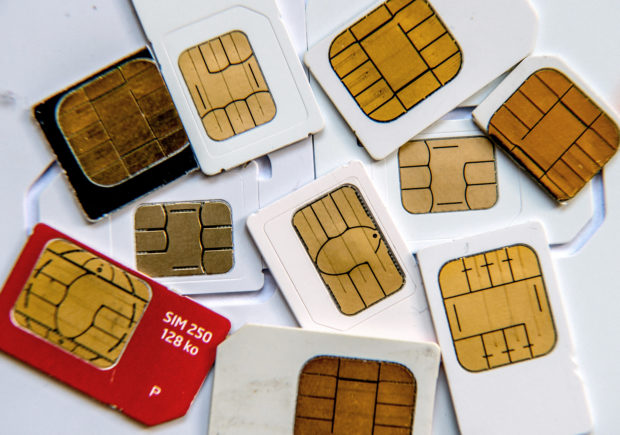
(Photo by Philippe HUGUEN / AFP)
MANILA, Philippines — President Rodrigo Duterte’s veto of a bill mandating SIM card and social media registration will allow cybercriminals, especially online scammers and trolls, to continue their thriving businesses unrestricted after he steps down from office, several senators warned on Saturday.
“By vetoing this bill, the president lets trolls thrive, spread lies and hate, and fuel discord and division,” Senate Minority Leader Franklin Drilon said in a statement.
“Political trolling as we’ve seen these days is a thriving business. This veto is a big win for troll farms,” he added.
Malacañang announced on Friday that Duterte had vetoed the enrolled version of Senate Bill No. 2395 and House Bill 5793, which would mandate the registration of all subscriber identity module (SIM) cards and social media accounts.
Acting presidential spokesperson Martin Andanar said Duterte was concerned that the provision requiring registration of social media accounts may lead to “dangerous state intrusion and surveillance, threatening many constitutionally protected rights.”
According to Drilon, the president’s veto was “a big blow to the growing fight against trolls and fake news.”
“Unfortunately, the veto is nothing but to protect troll operators and troll armies, some of them are in Malacañang,” Drilon said, in reference to hundreds of contractual employees of the Presidential Communications Operations Office who allegedly work as trolls for the administration.
He said that as long as anonymity on social media exists, political trolling, troll armies and fake news would succeed in sowing division among Filipinos.
Other lawmakers like Sen. Panfilo Lacson said the President made the right decision.
“Mandating social media registration could be violative of the ‘one-subject-one-title rule’ as defined under the 1987 Constitution, not to mention the absence of safeguards or guidelines in the said provision not even covered by the title of the measure itself,” said Lacson, chair of the Senate defense committee.
The title of the unified bill is “An Act to Eradicate Mobile Phone-Aided Terrorism and Criminal Activities, Mandating for this Purpose Ownership Registration of All Sim Cards for Cellular Phones.”
He said his version of the measure only requires the registration of all SIM cards.
Despite being the principal author of the bill in the 16th Congress (2013-2016), Valenzuela City Rep. Wes Gatchalian agreed with the president’s decision but was worried about the consequences.
“Filipinos will continue to experience fraud, scams, threats, unwanted messages, cybercrime, and terrorism without this law,” he said.
Gatchalian said that Drilon’s “last-minute insertion” to register all social media accounts was against the essence of the original bill.
That subject, which broadly covers the internet, should have been studied further and filed as a separate measure, he said.
Deputy Minority Leader and Bayan Muna Rep. Carlos Isagani Zarate on Saturday also welcomed the veto as the bill “gravely runs afoul with the Filipino people’s constitutionally guaranteed right to privacy and free expression.”
He said the Makabayan bloc voted against the bill because it would give government “easy access” to SIM cards and acquire all kinds of information from them.
The government could then act as “Big Brother” and able to monitor text messages and calls.
Besides, Zarate said, the measure won’t resolve the proliferation of text scams since criminals had “specialty tools” to send bogus text messages to dupe people.
Drilon dismissed the “unfounded” concerns that the measure could affect individual privacy and free speech, saying that the bill contained “enough safeguards” against any rights violations.
“Is it a parting gift?” he said.
The president leaves Malacañang at noon on June 30.
Senate President Vicente Sotto III also was disappointed with the veto.
“Nice! We can expect the bombings, blackmail, and scams using prepaid SIMs to continue,” Sotto said on Twitter.
Sen. Grace Poe, who sponsored the measure as chair of the Senate committee on public services, urged Congress to override the presidential veto.
“We count on Congress to act in a timely manner in reconsidering the bill for approval in accordance with the legislative process,” she said.
Bills vetoed by the President may still be passed into law if Congress overrides the veto by two-thirds of all members of each chamber voting separately — 203 out of 304 House members and 16 out of 23 senators.
Poe said the absence of a law protecting the public against online scams makes them more vulnerable to rip-offs.
“We shall remain firm and committed in our pursuit to end electronic and mobile phone-aided criminal activities and guarantee a safer and more secure mobile phone and cyberspace use in the country,” she said.
Without the safeguards from the measure, the onslaught of cybercrimes and fake news will continue to “tear away the fabric of our democracy,” Poe added.
She said the veto highlights the need to find “effective ways to protect our citizens and our democracy.”
—WITH A REPORT FROM JULIE M. AURELIO
RELATED STORIES
Drilon says veto of SIM card registration bill a ‘big win for trolls’
Social media registration in vetoed SIM bill a ‘last-minute insertion’ by Drilon — House leader
Activists welcome veto of SIM card registration bill: ‘It’s dangerous’